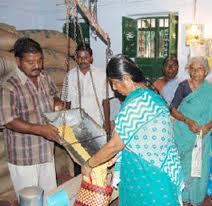First food: a taste of India’s biodiversity
This collection of around 100 recipes from different parts of the country brings to life the magic that takes place once biodiversity is combined with culinary dexterity.
This collection of around 100 recipes from different parts of the country brings to life the magic that takes place once biodiversity is combined with culinary dexterity.
There is one being-Indian-thing, which spans the urban or rural, rich and poor divide: our annual watch and wait for the monsoons. It begins every year, without a fail as heat climbs, and monsoons advance. The farmers wait desperately because they need the rain, at the right time, to sow their crops. Without this water, they cannot plant.

<p>The high corridors of the nation are abuzz with talk about how much food should be given to the country’s poor as a right. Should it be 25 kg of rice or 35 kg of wheat a month per person at highly subsidized rates? Read this latest blog by Sunita Narain, Director of CSE.</p>
The business of pretend-government must go The high corridors of the nation are abuzz with talk about how much food should be given to the country
<p>Memorandum to the Committee on Agriculture with views on “cultivation of genetically modified food crops – prospects and effects” presented at the sitting of the Committee on October 19, 2010.</p>
<p>Memorandum to the Committee on Agriculture with views on “cultivation of genetically modified food crops – prospects and effects” presented at the sitting of the Committee on October 19, 2010.</p>
CSE has found a cocktail of mostly banned and severely prohibited antibiotics in honey CSE has found a cocktail of mostly banned and severely prohibited antibiotics in honey They say, you are what you eat. But do we know what we are eating? Do we know who is cooking and who is serving us the food we take into our kitchens and then into our bodies?
In this year of biodiversity, stop and think of how it touches our daily lives
Our policy kept people out of their forests and made them trespassers in their own land Sunita Narain / New Delhi September 13, 2010, 0:16 IST The Forest Rights Act of 2006
<p><span style="font-size: 10pt">Presentation by Sunita Narain, Director of Centre for Science and Environment at the Plenary session of World Water Week at Stockholm on September 6, 2010. Focuses on decentralized wastewater management and says that localisation is the key & calls for affordable and sustainable approaches to waste management</span>.</p>
<br />We need to change our belief that minerals are more important than forests, water or people<br />Sunita Narain / New Delhi August 23, 2010, 0:29 IST<br />